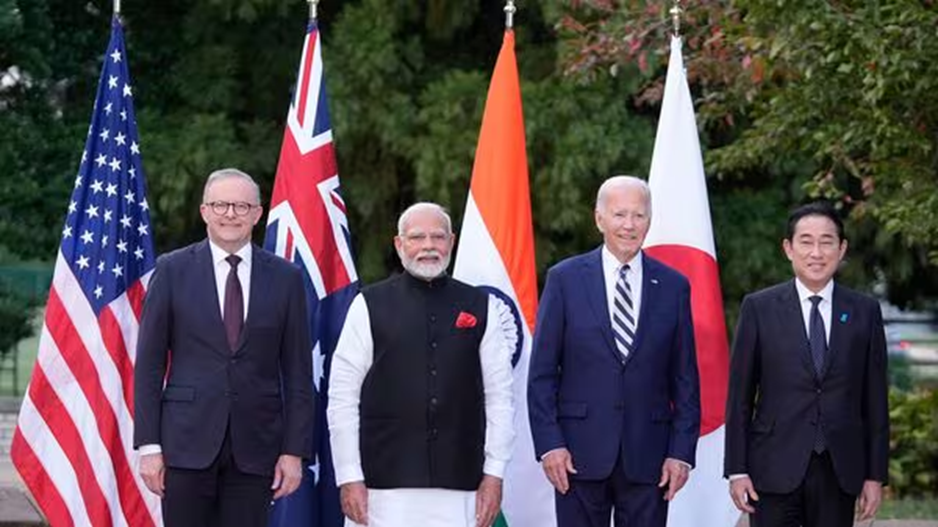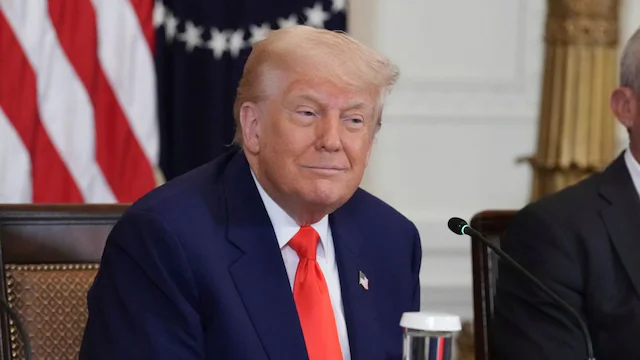- Courses
- GS Full Course 1 Year
- GS Full Course 2 Year
- GS Full Course 3 Year
- GS Full Course Till Selection
- Online Program
- GS Recorded Course
- NCERT (Recorded 500+ Hours)
- Polity Recorded Course
- Geography Recorded Course
- Economy Recorded Course
- AMAC Recorded Course
- Modern India, Post Independence & World History
- Environment Recoded Course
- Governance Recoded Course
- Science & Tech. Recoded Course
- International Relations and Internal Security Recorded Course
- Disaster Management Module Course
- Ethics Recoded Course
- Essay Recoded Course
- Current Affairs Recoded Course
- CSAT
- 5 LAYERED ARJUNA Mentorship
- Public Administration Optional
- ABOUT US
- OUR TOPPERS
- TEST SERIES
- FREE STUDY MATERIAL
- VIDEOS
- CONTACT US
Wilmington Declaration Joint Statement from the Leaders of Australia, India, Japan, and the United States
Wilmington Declaration Joint Statement from the Leaders of Australia, India, Japan, and the United States

The leaders of Australia, India, Japan, and the United States met for the fourth in-person Quad Leaders Summit in Wilmington, Delaware. The summit celebrated the Quad's achievements and reaffirmed its commitment to a free and open Indo-Pacific.
Enduring Partners for the Indo-Pacific
Meetings and Engagements:
- The Quad Leaders have met six times, including twice virtually.
- Quad Foreign Ministers have met eight times, most recently in Tokyo in July.
- Regular consultations at all levels to advance shared priorities and deliver benefits for partners across the Indo-Pacific region.
Institutionalization:
- All Quad governments have institutionalized the Quad at all levels and across various departments and agencies.
- Each Quad government has committed to securing robust funding for Quad priorities in the Indo-Pacific region to ensure an enduring impact.
Interparliamentary Exchanges:
- The Quad governments intend to work with their respective legislatures to deepen interparliamentary exchanges.
- Members of Congress announced the creation of a bipartisan, bicameral Congressional Quad Caucus.
Future Meetings:
- Quad Commerce and Industry ministers will meet for the first time.
- Leaders of Quad Development Finance Institutions and Agencies will meet to explore future investments.
- The United States will host the 2025 Quad Foreign Ministers Meeting, and India will host the 2025 Quad Leaders Summit.
Key Highlights of the Wilmington Declaration:
Strategic Alignment and Commitment:
- Four Years of Progress: The Quad has evolved into a vital and enduring regional grouping over the past four years, representing nearly two billion people and over one-third of global GDP.
- Shared Values: Anchored by shared values, the Quad seeks to uphold the international order based on the rule of law and is committed to a free, open, inclusive, and resilient Indo-Pacific.
- Regional Stability: The Quad stands for the maintenance of peace and stability in the Indo-Pacific and opposes any destabilizing or unilateral actions that seek to change the status quo by force or coercion.
- UN Security Council Resolutions: The leaders condemned recent illicit missile launches in the region that violate UN Security Council resolutions and expressed serious concern over dangerous and aggressive actions in the maritime domain.
Health Security:
- COVID-19 Response: The Quad delivered more than 400 million safe and effective COVID-19 doses to Indo-Pacific countries and almost 800 million vaccines globally, contributing $5.6 billion to the COVAX Advance Market Commitment.
- Quad Health Security Partnership: Launched in 2023, this partnership continues to deliver pandemic preparedness training to partners across the region.
- Quad Cancer Moonshot: A groundbreaking partnership to save lives in the Indo-Pacific region, focusing initially on combatting cervical cancer.
-
- United States: Support through U.S. Navy medical trainings and professional exchanges around cervical cancer prevention, and financing eligible private sector-driven projects.
- Australia: Expansion of the Elimination Partnership in the Indo-Pacific for Cervical Cancer Program (EPICC) with support from the Australian Government and the Minderoo Foundation.
- India: Commitment to providing HPV sampling kits, detection kits, and cervical cancer vaccines worth $7.5 million, and technical assistance for cancer screening and care.
- Japan: Provision of medical equipment, including CT and MRI scanners, and contributions to international organizations such as the Gavi Vaccine Alliance.
- Non-Governmental Initiatives: New commitments from the Serum Institute of India, Women’s Health and Empowerment Network, and other institutions to support cervical cancer prevention.
Humanitarian Assistance and Disaster Relief (HADR):
- Quad Partnership on HADR: Established in 2022, this partnership enables Quad countries to rapidly coordinate in the face of natural disasters.
- Humanitarian Assistance: Quad partners collectively contributed over $5 million in humanitarian assistance to Papua New Guinea following a landslide and over $4 million to Vietnam following Typhoon Yagi.
- Long-Term Resiliency: The Quad continues to support partners in the region in their longer-term resiliency efforts.
Maritime Security:
- Indo-Pacific Partnership for Maritime Domain Awareness (IPMDA): Offers near-real-time maritime domain awareness information to partners in the region, helping over two dozen countries access data to monitor their exclusive economic zones.
- Maritime Initiative for Training in the Indo-Pacific (MAITRI): A new initiative to enable partners to maximize tools provided through IPMDA and other Quad partner initiatives.
- Quad Maritime Legal Dialogue: Launched to support efforts to uphold the rules-based maritime order in the Indo-Pacific.
- Quad-at-Sea Ship Observer Mission: Planned for 2025 to improve interoperability and advance maritime safety.
- Quad Indo-Pacific Logistics Network: A pilot project to pursue shared airlift capacity among Quad nations to support civilian response to natural disasters more rapidly and efficiently.
Quality Infrastructure:
- Quad Ports of the Future Partnership: Aims to support sustainable and resilient port infrastructure development across the Indo-Pacific.
- Quad Infrastructure Fellowships: Expanded to over 2,200 experts, with over 1,300 fellowships provided since the initiative was announced.
- Quad Partnership for Cable Connectivity and Resilience: Supports quality undersea cable networks in the Indo-Pacific, with significant investments from Quad partners.
- Australia: Launched the Cable Connectivity and Resilience Centre in July, delivering workshops and policy and regulatory assistance.
- United States: Conducted over 1,300 capacity building trainings for telecommunication officials and executives from 25 countries in the Indo-Pacific, with an additional $3.4 million investment planned.
- India: Commissioned a feasibility study to examine expansion of undersea cable maintenance and repair capabilities in the Indo-Pacific.
- Japan: Extending technical cooperation to improve public (Infrastructure in Information and Communication Technologies (ICT) infrastructure management capacity for undersea cables in Nauru and Kiribati.
Critical and Emerging Technologies:
- Open Radio Access Network (RAN): Quad partners launched a landmark initiative to deploy the first Open RAN in the Pacific, with approximately $20 million pledged to this effort.
- Additional Open RAN Projects: Exploring additional projects in Southeast Asia, with plans to expand support for ongoing Open RAN field trials and the Asia Open RAN Academy (AORA) in the Philippines.
- Semiconductors: Committed to advancing cooperation on semiconductors to realize a diversified and competitive market and enhance resilience of Quad’s semiconductor supply chains.
- Advancing Innovations for Empowering NextGen Agriculture (AI-ENGAGE): Deepening leading-edge collaborative research to harness artificial intelligence, robotics, and sensing to transform agricultural approaches.
- Quad BioExplore Initiative: A funded mechanism to support joint AI-driven exploration of diverse non-human biological data across all four countries.
Climate and Clean Energy:
- Quad Climate Change Adaptation and Mitigation Package (Q-CHAMP): Continues to enhance climate and clean energy cooperation and promote adaptation and resilience.
- Clean Energy Supply Chains: Australia, India, Japan, and the United States are investing in clean energy supply chains and energy efficiency projects.
- Energy Efficiency: Focused effort to boost energy efficiency, including the deployment and manufacturing of high-efficiency affordable cooling systems.
- Port Infrastructure: Committed to fostering a path towards sustainable and resilient port infrastructure, including through the Coalition for Disaster Resilient Infrastructure (CDRI).
Cyber:
- Cybersecurity Partnership: Enhancing the partnership to address common threats posed by state-sponsored actors, cybercriminals, and other non-state malicious actors.
- Secure Software Development Standards: Partnering with software manufacturers, industry trade groups, and research centers to expand secure software development standards.
- Quad Action Plan to Protect Commercial Undersea Telecommunications Cables: Aims to advance future digital connectivity, global commerce, and prosperity.
Space:
- Earth Observation Data: Continuing to deliver Earth Observation data and other space-related applications to assist nations across the Indo-Pacific.
- India’s Space-Based Web Portal: Established for Mauritius to support the concept of open science for space-based monitoring of extreme weather events and climate impact.
Quad Investors Network (QUIN):
- Strategic Technologies: Facilitates investments in strategic technologies, including clean energy, semiconductors, critical minerals, and quantum.
- Supply Chain Resilience: Mobilizing investments to promote supply chain resilience, advance joint research and development, commercialize new technologies, and invest in the future workforce.
People-to-People Initiatives:
- Quad Fellowship: Building a network of the next generation of science, technology, and policy leaders, with the second cohort of Quad Fellows welcomed and the expansion of the program to include students from ASEAN countries.
- India’s Quad Scholarships: Announcing fifty Quad scholarships worth $500,000 for students from the Indo-Pacific to pursue a 4-year undergraduate engineering program.
Regional and Global Issues:
- ASEAN Centrality: Reaffirming support for ASEAN centrality and unity, and commitment to ensuring the Quad’s work is aligned with ASEAN’s principles and priorities.
- Pacific Island Countries: Committed to working in partnership with Pacific island countries to achieve shared aspirations and address shared challenges.
- Indian Ocean Region: Committed to strengthening cooperation in the Indian Ocean region and supporting IORA as the region’s premier forum.
- North Korea: Condemning North Korea’s destabilizing ballistic missile launches and calling for the complete denuclearization of the Korean Peninsula.
- Myanmar: Expressing deep concern over the worsening political, security, and humanitarian situation in Myanmar and calling for an immediate cessation of violence.
- Terrorism: Condemning terrorism and violent extremism in all its forms and manifestations, including cross-border terrorism, and reiterating commitment to pursuing designations by the UN Security Council 1267 Sanctions Committee.
- Middle East: Condemning terror attacks on October 7, 2023, and emphasizing the urgent need to significantly increase deliveries of life-saving humanitarian assistance throughout Gaza.
- Sustainable Development Goals (SDGs): Reaffirming commitment to the implementation of the 2030 Agenda and the achievement of its Sustainable Development Goals (SDGs).
Implications of the Wilmington Declaration for India
International Collaboration and Asset Recovery:
- India’s recognition from the Quad enhances its ability to cooperate with other nations in tracking and recovering illicit assets.
- Improved collaboration with global financial watchdogs aids in counter-terror financing efforts.
Improved Access to Global Financial Systems:
- Quad ratings improve India’s access to global financial markets, enabling easier borrowing and investments from international institutions.
- The recognition supports the global expansion of India’s Unified Payments Interface (UPI), making it a preferred choice for cross-border digital payments.
Strengthening Investor Confidence:
Positive evaluation enhances India’s credibility and boosts foreign investor confidence in financial markets, making India a more attractive destination for foreign direct investments (FDI).
Conclusion:
The Wilmington Declaration marks a significant milestone for the Quad in its efforts to promote a free, open, and inclusive Indo-Pacific. The recognition of India’s role in the Quad sets a benchmark for future economic growth and international collaboration. The need for continuous improvements in areas like health security, maritime security, and critical technologies remains crucial. This evaluation positions India favorably for future economic growth and international collaboration.

Must Check: Best IAS Coaching In Delhi
UPSC Prelims Result 2024 Out: Expected Cut Off & Other Details, UPSC Prelims 2024 Answer with Explanation, Daily Prelims Quiz, Daily Current Affairs, MONTHLY CURRENT AFFAIRS TOTAL (CAT) MAGAZINE, Best IAS Coaching Institute in Karol Bagh, Best IAS Coaching Institute in Delhi, Daily Mains Question Answer Practice, ENSURE IAS UPSC Toppers, UPSC Toppers Marksheet, Previous Year Interview Questions, UPSC Syllabus



